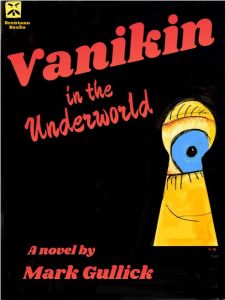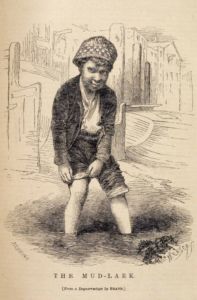Henry Mayhew’s London Labour & the London Poor
Posted By Mark Gullick On In North American New Right | Comments Disabled1,855 words
I hated being wicked, but I was tricked and cheated. I am truly sorry for it, but what could a poor girl do? — Henry Mayhew, interview with a street beggar, London Labour and the London Poor
But what can a poor boy do? — The Rolling Stones, “Street Fighting Man”
History has always troubled me. I don’t mean the grand Hegelian sweep of the past; that would be enough to trouble anyone. I mean the fact that I know so little about it. Not the kings and queens of England and the Ottoman Empire and the battles, but the minutiae — the lives of the little people. One book that I have thus returned to is Henry Mayhew’s 1861 London Labour and the London Poor (LL).
Mayhew was born in London in 1812, one of 17 children. He was privately educated but ran away to sea, and this was quite a culture change for a young man born into privilege. Dr. Johnson remarked that it was better to be in prison than the Navy; the food was better, as was the company.
Mayhew returned to London, however, and became a literary linchpin of a capital city just becoming fascinated with reportage. He founded and edited Punch, probably Britain’s most famous literary and satirical magazine. He knew Charles Dickens, and the pair might be called the greatest writers on the city of London. Mayhew was a minor playwright, but his literary legacy is his account of life at the bottom of the urban food chain, an anatomy of poverty which is still a moving documentary record of what people did before the welfare system when they had absolutely no money.
The Left have pulled off many sleights of hand since Mayhew’s time, but not many more audacious than that of the replacement of the concept of absolute poverty with relative poverty. Simplistically, poverty has been defined as [2] living on 60% or less of the median disposable income of wherever you are. This is an interesting, and wholly heartless, formula. It means that you are poor if you are lying gasping in a hut in sub-Saharan Africa — not because you have nothing to eat, a swollen belly, and flies on your eyelids you are too weak to brush off, but because you have less than two-thirds of the amount of spare meal-worms the people in the next hut have. It’s a technocratic measure of something for which mathematics is not an appropriate gauge. It also means that if you live in The Hamptons, you are poor if you don’t have an en suite bathroom. Of course, the poor will always be with you if you game the calibration of what it means to be poor, and LL explains that state in a way no modern technocratic jargon ever could. Other definitions talk about those living on less than $2 a day — but, again, it depends on where you are when you spend it. In Mayhew’s London, there was real, aching poverty.
What makes LL so engaging is that much of it is interviews with people who lived either on the Victorian street or in the most wretched of lodgings, and there is no question here of poverty being some kind of game of trumps. These people were poor, absolutely and not relatively. Small asides throughout set the tone for the book:
[I]f he took tea or coffee, it was as a meal, and not merely as a beverage . . . I want a coat very bad, sir . . . I’m paying for a pair of boots now. I paid a shilling off Saturday night . . . The Asylum for the Homeless Poor of London is opened only when the thermometer reaches freezing-point.
As someone in business might say, the margins for these people were very tight indeed.
Victor Neuberg, Mayhew’s editor, gives LL’s mission statement most succinctly: “His aim was to study the London poor, occupation by occupation, trade by trade, and he also explored the worlds of those who had neither trade nor occupation.”
It was an aim Mayhew achieved, and not least because of the atmosphere his restrained but descriptive journalistic language conjures up. Personally, I have little or no interest in food except as a means to the cessation of hunger, and I eat exactly the same thing every day, but even my appetite was piqued when I read Mayhew’s account of “vendors of fried fish, hot eels, pickled whelks, sheep’s trotters, ham sandwiches, peas’ soup, hot green peas, penny pies, plum ‘duff’, meat-puddings, baked potatoes, spice-cakes, muffins and crumpets . . .”
This culinary cornucopia has another meaning in the context of Mayhew’s book. He was observing the street vendors at around the beginning — in London, at least — of the age of the shopkeeper. London Labour and the London Poor is, as much as anything else, both a work of economics at street level and a study of a declining industry.
There are several pages of detailed accounts, expenses, demographics, weights, and measures which show the acuteness with which the organized street vendor or costermonger (those who sell not just one or two dedicated items, but anything that comes their way) had to operate. The simplicity of poverty calls not for sophistication, but basic principles of buying and selling. The difference between the business practices of the water-cress girls and the pie-sellers was simply one of fiscal degree. As one apple-seller tells Mayhew, “I buy my fruit at Covent Garden. Apples is now [sic] 4s 6d a bushel there. I may make twice that in selling them.”
 [3]
[3]You can buy Mark Gullick’s Vanikin in the Underworld here. [4]
The business models of the poor do not need PowerPoint presentations.
But the cast of Mayhew’s London is not just sellers and buyers. Street entertainment is still a feature of London today, and it was no different in Mayhew’s time. Tumblers, Punch and Judy men, fire-eaters, ballad singers, bagpipe-boys, “patterers” (somewhere between actors and speech-reciters), conjurers, and card sharps are all brought to life.
When reading of the past of one’s own home city, and from a historical distance of which I have been alive for around one third, there are certain aspects of the comparative ease of modern life which are brought into stark contrast by Mayhew’s testament, particularly with regards to cleanliness and hygiene.
What I believe are called “garbagemen” or “trash collectors” in the United States have always been known as “dustmen” in Britain, and it took LL to explain to me the obvious reason why: In the beginning they weren’t collecting bags full of pizza boxes, plastic wrappers, tea bags, egg cartons, and the rest of the inventory of modern detritus. In mid-nineteenth century London, they collected dust. Tons of the stuff. Every source of heat then was coal or wood. Coal was so precious that the mud-larks of the Thames — as well as looking in the filth for brooches, coins, and other trinkets — would also gouge around in the ooze for single lumps of the stuff, knocking it off incoming boats the better to pilfer it. The Thames is London’s dark heart here as elsewhere. Think of the eldritch and foreboding River Thames of Dickens’ Our Mutual Friend.
Mayhew suggests, however, that there may be a jewel in the dust, as he claims both that dustmen are notoriously long-lived, and also that in the Belleville area of London in 1849, a pestilent epidemic that had mass casualties elsewhere hardly affected the area, most of whose residents were dustmen.
If LL were being written today, it would be a little difficult to get its chapter on London’s street Jews past the sensitivity readers who dominate modern publishing, and who probably feel violated by Shylock and Fagin. One interesting juxtaposition within Mayhew’s description of London Jewry tells us something about our own time. He very much admires the conservatism of Jews when it comes to amatory arrangements: “There is not among the Jew street-sellers generally anything of the concubinage or cohabitation common among the costermongers. Marriage is the rule.”
Now, as we know today, if the nuclear family is Muslim or Jewish or black (unlikely) then it is sacrosanct and culturally ring-fenced. If the nuclear family is white, then this is white supremacy, and both parents should be forcibly sterilized. Thus, Mayhew’s comment above would get a pass. Not so, I suspect, with another gimlet-eyed observation: “They are fond of money, and will do anything to get it. Jews are perhaps the most money-loving people in all England.”
I can’t see the British Board of Deputies letting that one go.
Drunkenness and prostitution, as you would expect of the urban, abound, with their usual ruinous effects. It is a historical truism that both drinking and whoring was something the lower and the upper class had in common throughout much of England’s history, the difference being that — syphilis notwithstanding — only one of those classes could afford it, in both senses of the word. And again, unsurprisingly, criminality was rife in Dickensian London.
Some things about the criminal class in England never change. It is well known in the United Kingdom that many recidivist criminals reoffend because they fully intend to receive a prison sentence. They know instinctively and empirically that they are better off inside than on the streets. So, too, Mayhew recounts the story of boys who have every intention of being “in the clink.” One boy adds, “I generally learn something new in prison.” Not the dates of the kings and queens of England, I suspect.
As well as being a record of rudimentary economics, LL gives a strange sketch of the religious beliefs of those children who have only known deprivation, hardship, poverty, and hunger. One chimney-sweep interviewed by Mathew is asked his opinion of religion:
God was God, he said, he had heard he was good, but didn’t know what good he was to him. He thought he was a Christian, but he didn’t know what a Christian was. He had heard of Jesus Christ once, when he went to a Catholic chapel, but he never heard tell of who or what he was, and didn’t ‘particular care’ about knowing.
There is enough in that sweep’s comment to fund a book on theology.
London Labour and the London Poor is not a short read but, as a historical document, it brings history to life, to use the old teaching cliché, and LL is a delight. Should you be a Londoner like myself, it is essential reading. The current constant criticism of capitalism and the West fails to take into account records such as these, which show advance through adversity.
One of Mayhew’s many interviews — and they are highlights of the book — is with a boy who ran away from a tailor’s apprenticeship from the sheer love of adventure and literature. He describes himself as “deep boy for a book.” The lad is describing a book about Henry VIII, a book he had enjoyed so much he read it again, as I have done with Mayhew’s. The boy makes a comment about the book he enjoys so much that applies perfectly to London Labour and the London Poor: “It’s a book that’s connected with history, and that’s a good thing.”
* * *
Like all journals of dissident ideas, Counter-Currents depends on the support of readers like you. Help us compete with the censors of the Left and the violent accelerationists of the Right with a donation today. (The easiest way to help is with an e-check donation. All you need is your checkbook.)
For other ways to donate, click here [5].
